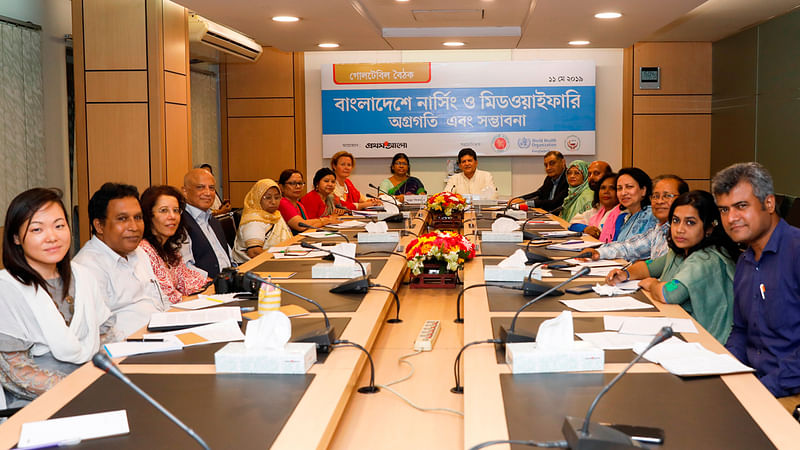'Nursing and midwifery should be empowered to achieve SDG goals'

Highlighting the importance of nurses and midwives for overall improvement of the healthcare system and attainment of Sustainable Development Goals, stakeholders recommended raising the profile of the professions, establishing adequate nursing institutions, imparting proper training and ensuring workplace safety.
Stakeholders hailed the overall development of the sectors in recent years but said the ratio of nurses to physicians is still inadequate.
Competent and trained midwives are important components in reducing child and maternal death, several speakers said at a roundtable on Saturday.
To attain the SDG target, Bangladesh needs to decrease maternal mortality to 70 per 100,000 which now stands at 172.
Prothom Alo, in association with the World Health Organization (WHO), organised the roundtable on development and possibilities of nursing and midwifery in Bangladesh, at the CA Bhaban in Karwan Bazar.
Former advisor to a caretaker government and executive chairperson of Power and Participation Research Center (PPRC) Hossain Zillur Rahman said, “These professions were once neglected but the scenario is changing nowadays, thanks to changing political will and commitment in this regard.”
A good foundation has been created in the nursing sector, but now we need increasing quality of nurses and their numbers, he added.
Referring to the recent rape and killing incident of a Kishoreganj nurse, speakers called for ensuring safety of the professionals.
Highlighting the importance of midwives in cutting down the maternal mortality rate, United Nations Population Fund’s (UNFPA) country representative Asa Torkelson said, “Every year 5,200 women die from preventable causes, which means one hundred women die every week. We can together stop this weekly tragedy.”
Directorate General of Nursing and Midwifery’ director general of Tandra Sikder said there is demand for professional nurses from Bangladesh in countries such as Australia and Libya.
“But, we have our own demand for nurses and midwives to attain SDG and that’s why we can’t export our quality professionals in these sectors,” she added.
Hussain Zillur said Bangladesh can think about exporting qualified nurses and midwives as it will help in gathering knowledge from foreign countries as well earning foreign remittance.
Tandra also said inadequate infrastructure and teachers for midwifes are one of the main challenges in these sectors.
World Health Organisation’s (WHO) representative to Bangladesh Bardan Jung Rana called for empowering nursing professionals by incorporating them at a policy making level.
“The community healthcare system did a lot to achieve MDG goals, but the country needs more qualified and competent professionals to attain SDG targets,” he added.
The health and family planning ministry’s additional director general Nasima Sultana said 12-13 thousand nurses are passing out every year from 99 public and 218 private institutions, which is much less than required.
Nasima called for increasing nursing colleges and institutes to meet the demand.
She also recommended upgrading the nurses with graduate, post graduate and doctoral degrees to first class, and increasing ratio of nurses to physicians.
Bangladesh Nursing and Midwifery Council’s registrar Suraiya Begum said Bangladesh can achieve 7 SDG goals by investing in midwifery.
BRAC’s vice chairperson Mushtaque Chowdhury said midwifery would not develop if it is not seen as an independent profession.
BRAC’s head of midwifery education programme Selina Amin emphasised the need to create an enabling environment for midwives.
Obstetrical and Gynaecological Society of Bangladesh’s (OGSB) general secretary Saleha Begum Chowdhury said number of caesarean section births will decrease once midwives are given proper training and knowledge.
Former vice chancellor of Bangladesh University of Health Sciences Liaquat Ali, Bangladesh Midwifery Society’s president Momtaz Begum, Bangladesh Nurses Association’s president Ismat Ara Parvin, among others spoke at the roundtable moderated by Prothom Alo associate editor Abdul Quayyum.